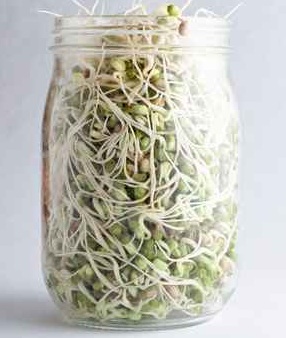SPROUTS: Superfood of the Future — Part 2
Author: admin
 Want to get healthy and fit, have energy to spare, and upgrade your diet with vitality-promoting superfoods?
Want to get healthy and fit, have energy to spare, and upgrade your diet with vitality-promoting superfoods?
Here’s some more information on the wonderful world of sprouts and growing sprouts at home.
Sprouting Your Way to Vitality
In his glorious poetry collection entitled Leaves of Grass, Walt Whitman wrote: “The smallest sprout shows there is really no death.” As a food, sprouts are approximately 5,000 years old. In 2939 BC, the emperor of China wrote about their versatile qualities, and these little gems still remain one of the most nutritious foods on earth. The humble sprout truly is one of nature’s most amazing creations. I always have sprouts growing at home.
Are you interested in losing weight? Consider starting your own sprout garden this week or month. Depending on the protein content, one fully packed cup of sprouts contains only 16 to 70 calories (I’ll write more about this in the next blog). They are the perfect weight-loss and body-purification food for this decade. And one quart-size glass jar of sprouts, like the photo in this blog, costs only pennies. Purchased in a store, it would be quite pricey.
This “garden in your hand” grows very fast in any weather with very little care. Most of them take less than a minute or two of your time per day for care. You can grow sprouts year-round, nearly anywhere indoors in any season, without any weather worries. No digging, planting, weeding, pests, or chemicals to worry about either. And there is no long wait as with outdoor vegetable gardens. In just two to seven days, you will have a nutrition-packed, bountiful harvest.
Reasons why sprouts deserve their superfood-ranking:
- Sprouts increase in nutritional content as they grow, and this increase proves to be truly remarkable. The vitamin C in sprouted peas, for example, increases eight-fold in four days. The vitamin B-complex in sprouted wheat increases six-fold, and vitamin E increases three-fold, in four days.
- Increased nutritional value does not stop there. Many different minerals abound in sprouts, and in an assimilable form. Sprouts provide a storehouse of enzymes, and all vegetables, nuts, seeds, beans, and grains begin life as sprouts.
- Homegrown sprouts are the freshest, most assuredly organic food available to you. Nothing compares with “picking your own” just before you eat them and knowing they’re free from fungicides and insecticides. When you eat sprouts, you are receiving the plant’s peak nutrition, when nature has mobilized all of its nourishment to bring forth a mature plant.
Think about it this way: Every seed is a plant embryo, waiting for the right conditions to respond with life and germinate into a shooting plant body. Some, like ancient Egyptian wheat, wait for thousands of years. When a seed meets the right combination of moisture, air and temperature, it begins to sprout forth very fast. Just like us, it strives to emerge into the world as a healthy body and to grow up big and strong. For this reason, sprouting seeds produce a wide and abundant array of concentrated vitamins, minerals, trace elements, enzymes, growth hormones, amino acids, simple sugars, and essential fatty acids — all of which are essential to human health as well. These nutrients are charged with energy — the energy of life. Instead of nine months, however, these sprouts are ripe and ready for the world in just a few days.
From alfalfa and lentil, to sunflower seeds and wheat grass, and to radish, red clover and broccoli sprouts, these little gems of nature will nourish you and your family from head to toe, and from the inside out. And remember that kids love to take over this sprouting adventure at home, too. What a great way to get them started early in life to grow their own sprouts and become a kitchen gardener. Many neighborhood children, whom I taught to grow sprouts and microgreens, use their jars or trays as class projects, too, and often teach other friends this new healthful hobby.
 If you’d like more information on sprouts and other superfoods, please check out the nutrition chapter in my new book, The Joy Factor: 10 Sacred Practices for Radiant Health, available on my website SusanSmithJones.com. I’m often asked where I get my sprouting supplies. I get sprouting kits, organic sprouting seeds, and other supplies through — HandyPantry.com. Everything is delivered to your door with detailed directions on how to get started. Their team of experts can answer all of your questions, too. In the next few blogs, I’ll write about the health benefits of wheatgrass sprouts, how to grow microgreens, and the many ways sprouts nourish your body and the planet.
If you’d like more information on sprouts and other superfoods, please check out the nutrition chapter in my new book, The Joy Factor: 10 Sacred Practices for Radiant Health, available on my website SusanSmithJones.com. I’m often asked where I get my sprouting supplies. I get sprouting kits, organic sprouting seeds, and other supplies through — HandyPantry.com. Everything is delivered to your door with detailed directions on how to get started. Their team of experts can answer all of your questions, too. In the next few blogs, I’ll write about the health benefits of wheatgrass sprouts, how to grow microgreens, and the many ways sprouts nourish your body and the planet.
